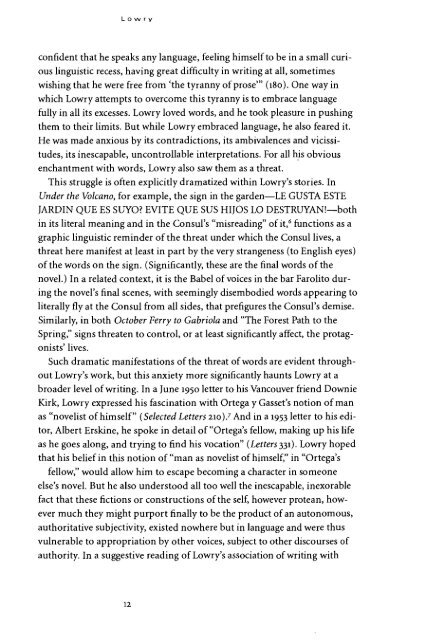A Quarterly of Criticism and Review i^^^^^^^^fcEjfc $15
A Quarterly of Criticism and Review i^^^^^^^^fcEjfc $15
A Quarterly of Criticism and Review i^^^^^^^^fcEjfc $15
Create successful ePaper yourself
Turn your PDF publications into a flip-book with our unique Google optimized e-Paper software.
Lowryconfident that he speaks any language, feeling himself to be in a small curiouslinguistic recess, having great difficulty in writing at all, sometimeswishing that he were free from 'the tyranny <strong>of</strong> prose'" (180). One way inwhich Lowry attempts to overcome this tyranny is to embrace languagefully in all its excesses. Lowry loved words, <strong>and</strong> he took pleasure in pushingthem to their limits. But while Lowry embraced language, he also feared it.He was made anxious by its contradictions, its ambivalences <strong>and</strong> vicissitudes,its inescapable, uncontrollable interpretations. For all his obviousenchantment with words, Lowry also saw them as a threat.This struggle is <strong>of</strong>ten explicitly dramatized within Lowry's stories. InUnder the Volcano, for example, the sign in the garden—LE GUSTA ESTEJARDIN QUE ES SUYO? EVITE QUE SUS HIJOS LO DESTRUYAN!—bothin its literal meaning <strong>and</strong> in the Consul's "misreading" <strong>of</strong> it, 6 functions as agraphic linguistic reminder <strong>of</strong> the threat under which the Consul lives, athreat here manifest at least in part by the very strangeness (to English eyes)<strong>of</strong> the words on the sign. (Significantly, these are the final words <strong>of</strong> thenovel.) In a related context, it is the Babel <strong>of</strong> voices in the bar Farolito duringthe novel's final scenes, with seemingly disembodied words appearing toliterally fly at the Consul from all sides, that prefigures the Consul's demise.Similarly, in both October Ferry to Gabriola <strong>and</strong> "The Forest Path to theSpring," signs threaten to control, or at least significantly affect, the protagonists'lives.Such dramatic manifestations <strong>of</strong> the threat <strong>of</strong> words are evident throughoutLowry's work, but this anxiety more significantly haunts Lowry at abroader level <strong>of</strong> writing. In a June 1950 letter to his Vancouver friend DownieKirk, Lowry expressed his fascination with Ortega y Gasset's notion <strong>of</strong> manas "novelist <strong>of</strong> himself" (Selected Letters 210)/ And in a 1953 letter to his editor,Albert Erskine, he spoke in detail <strong>of</strong> "Ortega's fellow, making up his lifeas he goes along, <strong>and</strong> trying to find his vocation" (Letters 331). Lowry hopedthat his belief in this notion <strong>of</strong> "man as novelist <strong>of</strong> himself," in "Ortega'sfellow," would allow him to escape becoming a character in someoneelse's novel. But he also understood all too well the inescapable, inexorablefact that these fictions or constructions <strong>of</strong> the self, however protean, howevermuch they might purport finally to be the product <strong>of</strong> an autonomous,authoritative subjectivity, existed nowhere but in language <strong>and</strong> were thusvulnerable to appropriation by other voices, subject to other discourses <strong>of</strong>authority. In a suggestive reading <strong>of</strong> Lowry's association <strong>of</strong> writing with12
















